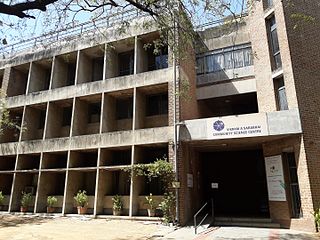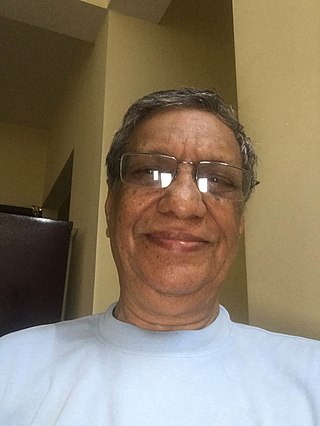Related Research Articles

The American Meteorological Society (AMS) is a scientific and professional organization in the United States promoting and disseminating information about the atmospheric, oceanic, and hydrologic sciences. Its mission is to advance the atmospheric and related sciences, technologies, applications, and services for the benefit of society.
The Shanti Swarup Bhatnagar Prize for Science and Technology (SSB) was a science award in India given annually by the Council of Scientific and Industrial Research (CSIR) for notable and outstanding research, applied or fundamental, in biology, chemistry, environmental science, engineering, mathematics, medicine, and physics. The prize recognized outstanding Indian work in science and technology. It was the highest, most prestigious and coveted prize given in the area of multidisciplinary science in India. The award was named after the founder Director of the Council of Scientific & Industrial Research, Shanti Swarup Bhatnagar. It was first awarded in 1958.

The Council of Scientific and Industrial Research is a research and development (R&D) organisation in India to promote scientific, industrial and economic growth. Headquartered in New Delhi, it was established as an autonomous body in 1942 under the aegis of the Department of Scientific and Industrial Research (DSIR), Ministry of Science and Technology, Government of India. CSIR is among the largest publicly funded R&D organisations in the world. CSIR has pioneered sustained contribution to science and technology (S&T) human resource development in India.

The National Institute of Science Communication and Information Resources (NISCAIR), located at New Delhi, India, was an information science institute in India founded in 2002. In 2021, the institute was merged with National Institute of Science, Technology and Development Studies to form National Institute of Science Communication and Policy Research (NIScPR). It operated under the umbrella of the Council of Scientific and Industrial Research (CSIR) that comprise 38 other labs and institutes in India. The institute published several academic journals and magazines.

The Mexican Academy of Sciences(Academia Mexicana de Ciencias) is a non-profit organization comprising over 1800 distinguished Mexican scientists, attached to various institutions in the country, as well as a number of eminent foreign colleagues, including various Nobel Prize winners. The organization, which encompasses exact and natural sciences as well as the social sciences and humanities, is founded on the belief that education, based on the truth of scientific knowledge, is the only means, in the short and long term, of achieving the development of the Mexican spirit and national sovereignty.

The Central Arid Zone Research Institute (CAZRI) is one of the biggest research institutes of the Indian Council of Agricultural Research (ICAR), an autonomous organization working under the aegis of the Department of Agriculture Research and Education (DARE) of the Ministry of Agriculture and Farmers Welfare of Government of India. CAZRI has the distinction of being one of the first institutes in the world exclusively devoted to arid zone research and development. The institute made a humble beginning in 1952 when Government of India initiated Desert Afforestation Research Station at Jodhpur to carry out research on sand dune stabilization and for establishment of shelter belt plantations to arrest wind erosion. It was reorganized as Desert Afforestation and Soil Conservation Station in 1957 and finally in its present form Central Arid Zone Research Institute in 1959 on recommendation of the UNESCO (United Nations Educational, Scientific and Cultural Organization) expert, Prof. C.S. Christian of the Commonwealth Scientific and Industrial Research Organisation (CSIRO), Australia. In 1966, the institute was brought under the administrative control of Indian Council of Agricultural Research (ICAR), New Delhi.

Vikram A Sarabhai Community Science Centre, commonly known as VASCSC, was established in the 1960s by the eminent space scientist, Vikram Sarabhai in Ahmedabad, Gujarat, India. The centre works towards popularising science and mathematics education among students, teachers and the public. Its mandate is to stimulate interest, encourage and expose the principles of science and scientific method and also to improve and find innovative methods of science education. It is located opposite Gujarat University. VASCSC is open to all members of the community.
Ashok Jhunjhunwala is an Indian academic and innovator. He received his B.Tech. from the Indian Institute of Technology, Kanpur and PhD from the University of Maine. He has been a faculty member at the Indian Institute of Technology Madras since 1981. He is the President of IIT Madras Research Park and Chairman of International Institute of Information Technology, Hyderabad. During his career, he has contributed extensively to technology innovation and adoption in the Indian context.

Motilal Madan is an Indian biotechnology researcher, veterinarian, academic and administrator. In a career spanning over 35 years, Madan published 432 research articles and policy papers in international and national reference journals—including 226 original research papers—and pioneered research in reproductive endocrinology, embryo biotechnology, In vitro fertilisation, and cloning.
The term scientific temper is broadly defined as "a modest open-minded temper—develop new light, new knowledge, new experiments, even when their results are unfavourable to preconceived opinions and long-cherished theories." It is a way of life which uses the scientific method and which may, consequently, include questioning, observing physical reality, testing, hypothesizing, analyzing, and communicating. Discussion, argument and analysis are vital parts of scientific temper. It aims to inculcate the values of scientific thinking, appreciate scientific development, and drive away superstition, religious bigotry, and all forms of pseudo-science.

Tanjore Ramachandra Anantharaman was one of India's pre-eminent metallurgists and materials scientists.

The Department of Science and Technology (DST) is a department within the Ministry of Science and Technology in India. It was established in May 1971 to promote new areas of science and technology and to play the role of a nodal department for organising, coordinating and promoting scientific and technological activities in the country. It gives funds to various approved scientific projects in India. It also supports various researchers in India to attend conferences abroad and to go for experimental works.
National Science Day is celebrated in India on February 28 each year to mark the discovery of the Raman effect by Indian physicist Sir C. V. Raman on 28 February 1928.

K. Radhakrishnan a.k.a Koppillil Radhakrishnan is an Indian space scientist who headed the Indian Space Research Organisation (ISRO) as Chairman of Space Commission, Secretary of the Department of Space, Government of India. Under his leadership, India became the first country to reach Mars in its first attempt.

Prem Chand Pandey is an Indian space scientist, planetary scientist, and academic in the fields of satellite oceanography, remote sensing, atmospheric science, the Antarctic and climate change, and also he is the founding director of the National Centre for Polar and Ocean Research (NCPOR).

M. P. Parameswaran is an Indian nuclear engineer and educationist, who played an important role in the Indian nuclear programme. In 2022, he was honoured with Kerala Sree Award, third highest civilian award given by the Government of Kerala.
All India Peoples Science Network (AIPSN) is a national network of Peoples Science Movements of India. It was established in the first All India Peoples Science Congress, organised in 1988 at Kannur in Kerala State. The attempt to establish a national platform for science organisations in India started in the late 1960s. By that time, there were Science organisations in West Bengal, Assam, Orissa, Kerala and Maharashtra. In many other states, there were committed scientists who were interested to work with people for a social cause.
Narender K. Sehgal was an Indian physicist, scientific administrator, and science populariser. He was born in Lahore. He worked as Scientific Officer in the Theoretical Reactor Physics Division of Bhabha Atomic Research Centre. In 1963 he went to US for his MSc and PhD in particle physics from the University of Wisconsin–Madison. He became professor of physics at the Somali National University in Magadiscio, East Africa. He returned to India in 1978 as visiting scientist at the Space Applications Centre (SAC) of Indian Space Research Organisation (ISRO). In 1982 he joined the Department of Science and Technology of the Government of India. He was head of the National Council for Science and Technology Communication (NCSTC) and later Vigyan Prasar, where he remained until his retirement in 2000.
Anil Sadgopal is an Indian educationist and activist, known for the Hoshangabad Science Teaching Programme and for advocacy related to the Right to Education (RTE) Act. He is a recipient of several awards and honours, including the Jamnalal Bajaj Award for 'Application of Science and Technology for Rural Development'. He was instrumental in setting up Eklavya foundation in 1982. For over a decade, he was Professor of Education at Delhi University, and headed its Department of Education during 1998-2001. Since 2004-2005, he has been campaigning for changes in the RTE Act, which he believes is flawed.

India Science is an internet-based science OTT television channel launched in 2019 as part of an initiative of the Department of Science and Technology (DST), Govt of India. The channel is managed and operated by Vigyan Prasar (VP), an autonomous organization of the DST, and is dedicated to science and technology related subjects.
References
- ↑ Jeevan, V. K. J. (2008). "Science awareness through public libraries in India". Annals of Library and Information Studies. 55 (3): 224–233.
- 1 2 3 "National Council for Science & Technology Communication NCSTC". dst.gov.in. Retrieved 25 March 2020.
- 1 2 Patairiya, Manoj (20 March 2002). "Science communication in India: perspectives and challenges". SciDevNet. Retrieved 25 March 2020.
- 1 2 Gupta, Archana (2003). "The Five Year Plans and the Role of the Council of Scientific and Industrial Research in the Development of the Country". Journal of Scientific and Industrial Research. 62 (5): 428–435. ISSN 0975-1084.
- ↑ "7th Five Year Plan (Vol-2): SCIENCE AND TECHNOLOGY". NITI Aayog. Retrieved 25 March 2020.
- ↑ Uddin, Sami (1990). Entrepreneurial Development in India. New Delhi: Mittal Publications. p. 268. ISBN 81-7099-190-0. OCLC 21525060.
- ↑ Patairiya, Manoj Kumar (2016-07-15). "Science Communication in India: An Assessment". The Journal of Deliberative Mechanisms in Science. 4 (1). doi:10.17583/demesci.2016.2182 (inactive 1 November 2024).
{{cite journal}}: CS1 maint: DOI inactive as of November 2024 (link) - ↑ Sinha, Anuj (2017), Bagla, Pallava; Binoy, V. V. (eds.), "Organising Children's Science Congress: Challenges and Opportunities", Bridging the Communication Gap in Science and Technology, Springer Singapore, pp. 255–268, doi:10.1007/978-981-10-1025-5_19, ISBN 978-981-10-1024-8
- ↑ "National Science Day 2020 speech ideas - Times of India". The Times of India. 28 February 2020. Retrieved 2020-03-25.
- ↑ "National Teachers Science Congress (NTSC)". www.ntscindia.in. Retrieved 2020-03-25.
- ↑ "National Science Day 2020—A Curtain Raiser". pib.gov.in. 26 February 2020. Retrieved 2020-03-25.

